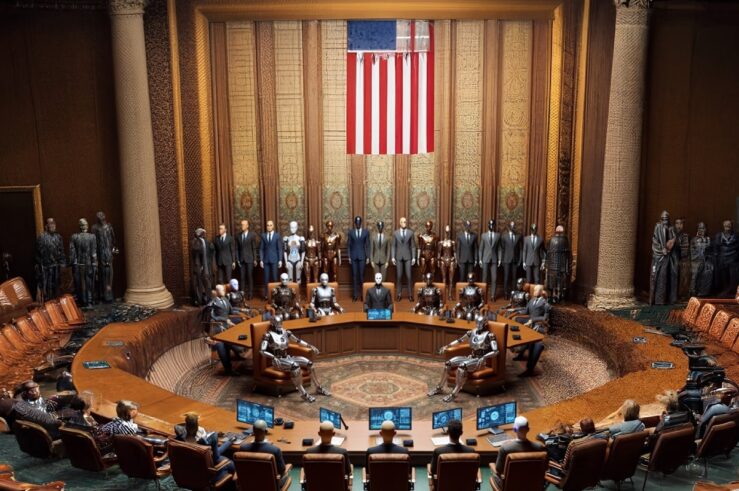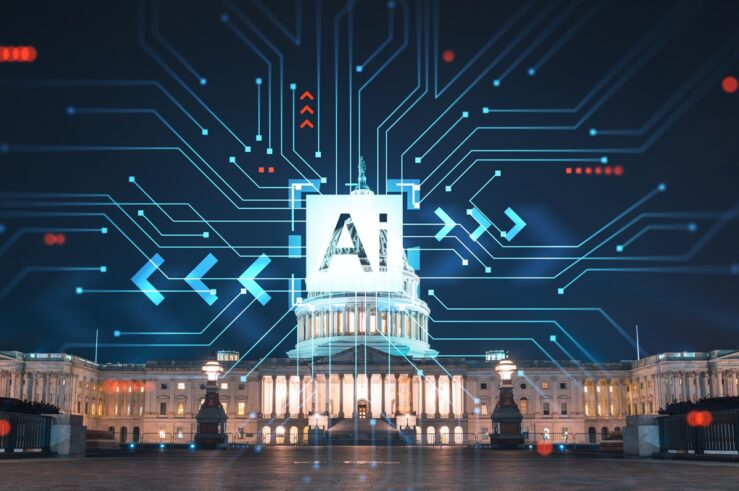Showing archive for: “AI & Big Data”
AI Hallucinations, GDPR, and the Importance of Cautious Optimism
The General Data Protection Regulation (GDPR), the EU’s data-protection law, requires accuracy in processing personal data. But generative-AI services, such as large language models (LLM), may “hallucinate” or reflect information that is false but widely spread. On one hand, such inaccuracies may seem like an inherent feature of the technology. On the other, some major ... AI Hallucinations, GDPR, and the Importance of Cautious Optimism
DOJ’s Not-so-Modest Proposal
The U.S. Justice Department (DOJ) late last month filed its much-anticipated initial proposed final judgment in the Google Search antitrust case. The proposal—to use a bit of baseball parlance—swung for the fences. Maybe they’ll get a hit, or maybe even a home run. Or not. Dodgers superstar Shohei Ohtani hit a whopping 54 home runs ... DOJ’s Not-so-Modest Proposal
The AI Legislative Puzzle
With Donald Trump’s victory in this week’s presidential election, the federal government’s approach to the regulation of artificial intelligence (AI) stands at a crucial inflection point. While there may be pressure to rush through AI legislation during Congress’ upcoming lame-duck session, such haste could prove counterproductive for U.S. leadership in AI development. Instead, this transition ... The AI Legislative Puzzle
Should the GDPR Prohibit AI?
The European Data Protection Board’s (EDPB) Nov. 5 stakeholder consultation on AI models and data protection—organized to gather input for an upcoming Irish Data Protection Commission opinion under Article 64(2) of the General Data Protection Regulation (GDPR)—showcased significant lingering disagreement on how the GDPR should apply to AI. While the event was not intended to ... Should the GDPR Prohibit AI?
Weighing DOJ’s Proposed Remedies for Google’s Monopolization
The U.S. Justice Department (DOJ) has proposed remedies to a federal judge who held that Google illegally monopolized web search. In reviewing the DOJ’s recommendations, the judge should take into account the downsides of particular remedies, as well as their potential benefits. The judge should be careful not to impose remedies that could reduce innovation ... Weighing DOJ’s Proposed Remedies for Google’s Monopolization
Don’t Believe the Hype (on Competition and AI)
As in the Public Enemy song that gives this post its title, the hype about alleged competition risks in the artificial intelligence (AI) “market” is a sequel—and not a good one—to the hyperbolic and dystopian view that has informed several recent antitrust-policy proposals and demands for tougher enforcement of competition laws, particularly in digital markets. ... Don’t Believe the Hype (on Competition and AI)
U.S. Antitrust Enforcers Should Reject AI Interventionism
The U.S. Justice Department (DOJ) and Federal Trade Commission (FTC), in tandem with their fellow competition-law enforcers from Europe (the European Commission) and the United Kingdom (the Competition and Markets Authority, or CMA), issued a joint statement July 23 titled “Joint Statement on Competition in Generative AI Foundation Models and AI Products.” This joint statement ... U.S. Antitrust Enforcers Should Reject AI Interventionism
The View from Canada: A TOTM Q&A with Aaron Wudrick
Aaron, could you please tell us a bit about your background and how you became interested in competition law and digital-competition regulation? I’m a lawyer by profession, but have taken a somewhat unconventional career path—I started as a litigator in a small general practice in my hometown outside Toronto, moved on to corporate law with ... The View from Canada: A TOTM Q&A with Aaron Wudrick
Should the Federal Government Regulate Artificial Intelligence?
Artificial intelligence is in the public-policy spotlight. In October 2023, the Biden administration issued its Presidential Executive Order on AI, which directed federal agencies to cooperate in protecting the public from potential AI-related harms. President Joe Biden said in his March 2024 State of the Union Address that government enforcers will crack down on the ... Should the Federal Government Regulate Artificial Intelligence?
AI Partnerships and Competition: Much Ado About Nothing?
Competition policymakers around the world have been expressing concerns about competition in emerging artificial-intelligence (AI) industries, with some taking steps to investigate them further. These fears are notably fueled by a sense that incumbent (albeit, in adjacent markets) digital platforms may use strategic partnerships with AI firms to stave off competition from this fast-growing field. ... AI Partnerships and Competition: Much Ado About Nothing?
Antitrust at the Agencies Roundup: Spring Has Sprung
Last week was the occasion of the “spring meeting”; that is, the big annual antitrust convention in Washington, D.C. hosted by the American Bar Association (ABA) Antitrust Section. To engage in a bit of self-plagiarism (efficient for me, at least), I had this to say about it last year: For those outside the antitrust world, ... Antitrust at the Agencies Roundup: Spring Has Sprung
Systemic Risk and Copyright in the EU AI Act
The European Parliament’s approval last week of the AI Act marked a significant milestone in the regulation of artificial intelligence. While the law’s final text is less alarming than what was initially proposed, it nonetheless still includes some ambiguities that could be exploited by regulators in ways that would hinder innovation in the EU. Among ... Systemic Risk and Copyright in the EU AI Act
















